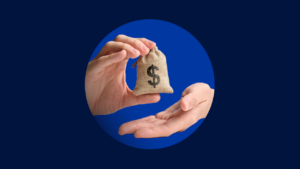How to pay off a personal loan faster: 5 paths to early payoff




Key takeaways
- Making extra payments or picking up a side job are effective ways to pay off a personal loan faster.
- Tightening your budget or refinancing your loan can also help with early payoff.
- Early payoff can save hundreds or thousands of dollars in interest, but check for prepayment fees first before paying a loan off early.
Paying off debt before your final due date could save you hundreds — if not thousands — of dollars’ worth of interest over the life of a personal loan, especially if you’re stuck with a bad credit personal loan rate. And with prepayment penalties becoming increasingly obsolete, many borrowers are working diligently to pay off their loans sooner.
If you’re looking to pay off a personal loan more quickly, there are a few ways you could accomplish your goals. Before committing extra cash to paying off debt, consider your savings situation and your monthly budget. Knowing how each early payoff option works can help you choose one that won’t break the bank or put strain on your regular spending.
1. Make biweekly payments
A relatively easy way to pay your personal loan off faster is to set up biweekly payments. It may not seem like much, but every year you’ll end up making one extra full payment. Most lenders allow you to make extra payments on your personal loan without incurring an additional fee, making it a cost-effective method. Some lenders even offer an automatic biweekly payment option.
This option won’t add a significant financial burden or cost to your budget. You can use a biweekly payment calculator to do the math, or you can just divide your current loan payment in half and pay it every two weeks.
Here’s an example of how much you can save by making a biweekly payment on a $20,000 personal loan, assuming an APR of 13 percent and a five-year (60-month) repayment term.
| Biweekly payments | Monthly payments | |
|---|---|---|
| Payment amount | $227.53 every two weeks | $455.06 every month |
| Total interest paid | $6,378.42 | $7,303.69 |
| Total saved in interest | $925.27 | $0 |
| Months to payoff | 54 | 60 |
By making biweekly payments, you could save over $900 in interest charges and pay off your loan six months ahead of schedule.
2. Pay extra when you get extra money
To make bigger steps toward early payoff, apply larger payments to your principal when you receive extra cash. Use some or all of the funds received from a holiday cash gift, a year-end bonus or a tax refund to hack away at your loan balance.
Keep the following considerations in mind when deciding whether to use this method:
- You may need to contact your lender directly to make sure they apply the amount to your principal balance.
- Your monthly payment amount won’t decrease like it would if you paid down your balance on a credit card — you’ll continue to owe the same amount each month until the loan is paid in full.
- Cover other financial bases first. For example, if you don’t have at least $1,000 in an emergency fund, deposit cash to cover that before you apply a large amount to your personal loan balance.
3. Revisit your budget
If you haven’t checked your monthly budget lately, take some time to review your spending. Pay close attention to discretionary spending on restaurants, movies and monthly subscriptions to see if there are areas where you could scale back.
If you haven’t reviewed your car or home insurance statement lately, see if the premiums have increased. You could save significantly by switching to a company that offers discounts for new business or offers overall lower premiums.
4. Refinance your current personal loan
When you refinance a personal loan, you typically replace it with a new loan at a lower rate. You could reduce your annual percentage rate (APR) by a significant amount if your credit score has increased into the good or excellent range, since the best personal loan rates are typically given to those with strong credit. Refinancing may be an especially good option if you borrowed with bad credit but now qualify for a low-interest personal loan with better terms.
You can also reduce the length of your repayment term, which will cut down your total interest cost. Lenders also tend to offer lower personal loan rates for short terms. Keep in mind that a shorter term will lock you into a higher monthly payment (unless you also qualify for a much lower rate). Check the total cost of your current loan against a potential refinance to be sure you’re saving money — both monthly and overall.
Use a personal loan calculator to see how different APRs or repayment terms of a new loan would change your monthly payment and total interest paid.
5. Find a secondary source of income
It may be easier said than done, but finding extra income streams could help you pay off your loan early. Starting a side hustle doesn’t commit you to another full-time job. You can try jobs with flexible hours, like babysitting, pet sitting, tutoring, food and grocery delivery or driving for Uber.
A recent Bankrate Side Hustle Survey found that roughly one in five (20 percent) side hustlers use the extra money to pay down debt, while 28 percent put at least some of the additional income into savings.
Pros and cons of paying off a loan early
If you’re still on the fence about whether it makes sense to pay off your personal loan early, weighing the pros and cons may help you make a final decision.
Pros
- You’ll pay less interest over the life of the loan. Paying off your loan early could save you hundreds (or even thousands) of dollars in interest.
- You’ll be out of debt faster. Making more than the minimum monthly payment also means you’ll kick debt to the curb quicker, freeing up cash for other important financial goals, like saving for retirement.
- You could reduce your payment. If you secure a lower rate by refinancing your personal loan, you could see a drop in your monthly payments.
Cons
- You’ll use cash that could be used toward saving or investing. Depending on your financial situation, the money spent on paying off your loan early could be better used toward beefing up your savings or an investment that pays a potentially higher return.
- You may be charged a prepayment penalty. Although it’s rare, some lenders may charge prepayment penalties for paying your loan off early, which could negate some of the money you’d save on interest. Before deciding to pay off a loan early, review your loan contract for a prepayment penalty clause.
- Your payment may increase. While refinancing to a shorter-term loan could result in substantial savings, keep in mind that your monthly loan payments could increase.
How paying off a personal loan affects your credit
Paying off a loan can negatively impact your credit score, but don’t let that scare you. If you have a healthy mix of accounts, including credit cards and installment loans, the drop should be small. These minor impacts are often temporary and may include:
- Removing an installment credit, making your credit mix less diverse.
- Shortening your credit history, if you’ve had the loan for a long time.
- Closing the installment loan account may mean that your positive payment history on that loan is less impactful.
While your credit score may take a small hit when you first pay off the debt, the long-term impact on your finances is positive. Although the impact may be reduced, all of your on-time payments will continue to reflect positively on your credit, potentially making it easier to qualify for a loan in the future. And without the loan payment, you’ll free up more money to put toward other debts or save.
Bottom line
You can take several steps to pay off a personal loan faster, including making additional payments or refinancing to a loan with a lower interest rate. But before you make extra payments, review your budget to see if it makes sense for your finances and goals.
Why we ask for feedback Your feedback helps us improve our content and services. It takes less than a minute to complete.
Your responses are anonymous and will only be used for improving our website.
You may also like


Best personal loans with no prepayment penalty

How to boost your personal loan approval odds: 5 tips

